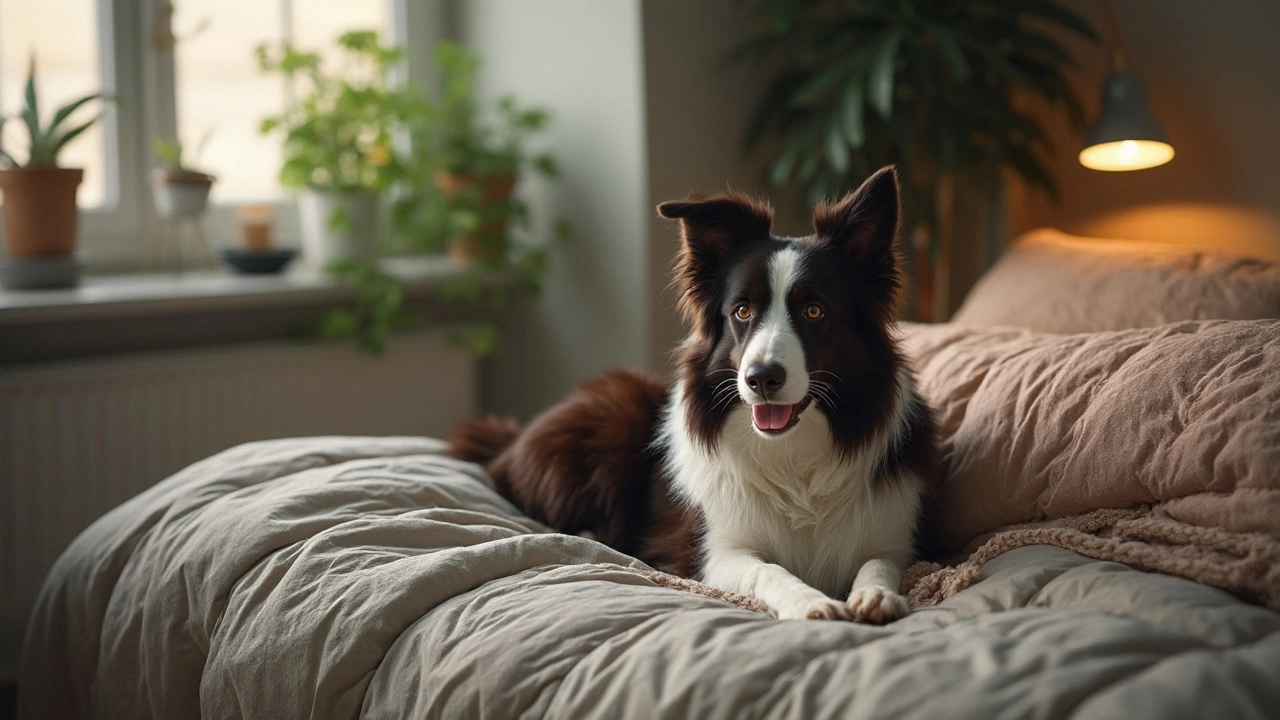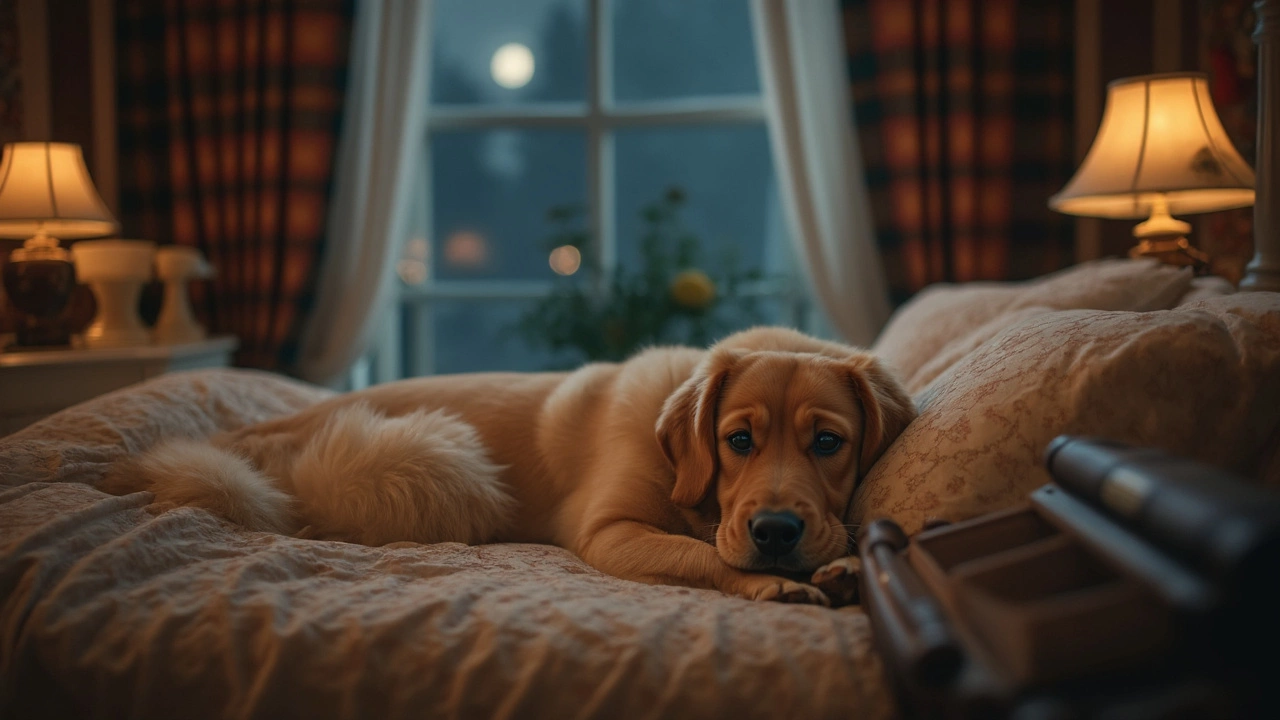Have you ever woken up to find your furry friend snuggled up next to you, even though they have a perfectly good dog bed of their own? It's a situation many dog owners know well and it turns out, there's more to it than just the softness of your mattress.
For many dogs, sharing a bed with their favorite human is all about comfort and security. Your presence offers a sense of safety that your dog craves, especially during the night when they might feel more vulnerable. Understanding this behavior means understanding the bond you share with your pet.
Comfort and Security
Lots of dog behavior experts agree that one of the main reasons dogs choose to sleep next to their humans is for comfort and security. Think about it. In the wild, dogs used to sleep together as a pack. It's how they stayed safe from predators and kept warm. While today's dogs are far removed from their wild ancestors, some habits die hard.
Your bed, with its familiar scents and warmth, mimics those cozy pack naps. It's a space where your dog feels loved and protected. This closeness isn't just comforting; for your furry buddy, it's a sign that everything's right with the world. So when your dog hops up next to you, they're really just channeling their inner pack instincts.
Familiar Scents
Your scent is another key factor. Dogs have an incredibly strong sense of smell—thousands of times more acute than ours. Being close to you surrounds them with familiar smells that offer comfort, almost like a security blanket. It's also because you're their favorite human, and cuddling with you after a long day is their ultimate reward.
Security in Numbers
Dogs are naturally social animals. They gain confidence and feel safe when they're not alone. This is especially true if your pet ever experienced separation anxiety. Sharing your bed allows your dog to know you're near, which can reduce their stress and promote a sense of well-being.
Warmth and Coziness
Let's not forget about the sheer coziness factor. Your big, soft bed is practically a cloud compared to most dog beds. The warmth from your body is also comforting, especially on cold nights. Your presence acts as a live 'electric blanket,' where snuggling up with you is tons more appealing than curling alone in their bed.
Bonding and Companionship
Ever noticed how your dog sticks by your side, especially when it's time to hit the hay? This isn't just about finding a good spot to snooze; it’s deeply rooted in your dog’s instinctive need to bond. Dogs are naturally social creatures, and this bedtime habit strengthens the bonding between you and your canine buddy.
Sharing a bed is like living in a pack for your dog. In the wild, pack members sleep close together as a display of unity and safety. You, as your dog’s pack leader, represent their source of comfort. The warmth and rhythmic sound of your heartbeat provides a soothing backdrop for your dog's sleep, taking them back to that instinctual space where safety reigns.
Strengthening the Human-Dog Bond
When dogs snuggle up with you at night, it’s their way of saying you’re an important part of their world. This closeness isn't just a comfort blanket for your dog; it fosters trust and a deeper emotional bond. Studies have shown that close contact with your pet, like sharing a bed, can release oxytocin, known as the “love hormone,” in both you and your dog.
- Encourage safe snuggling by setting boundaries. Allow your dog on the bed only when invited.
- If your dog is restless or chatty at night, it could mean they’re seeking more bonding time. Try spending more quality play time during the day.
Understanding your dog’s need for companionship will not only make your pet happier but could also contribute to their overall well-being. Keep nurturing this incredible connection every time you tuck your pup in beside you.

Anxiety and Warmth
Ever notice how your dog loves sprawling beside you when they're anxious? It's not just a cute quirk—it's a genuine need for reassurance. Dogs, like us, can get anxious under certain circumstances, whether from a thunderstorm, being in a new environment, or just missing you after you’ve been out all day. Snuggling up with you provides comfort and eases their anxiety.
Warmth also plays a big role here. Dogs are naturally drawn to warmth when they sleep, and it's no wonder they love nestling close to their human heaters. Your body heat offers consistent warmth, which their dog beds can't always match, especially if the room's a bit chilly.
Understanding Separation Anxiety
Many dogs deal with separation anxiety, and co-sleeping can help lessen its impact. This makes them feel connected to you even when you're busy or away. If your dog isn't sleeping well due to anxiety, staying close to you might just be their way of calming down.
How to Help Your Dog Cope
- Establish a bedtime routine that includes a few calming minutes with your pet. It could be as simple as a gentle back rub or a few soothing words.
- Consider investing in calming aids, like pet-safe essential oils or specialized comfort toys.
- A warm blanket in their dog beds can replicate the warmth they seek from you.
Recognizing these needs doesn't just help your dog feel better—it can also lead to a better night's sleep for you both!
Tips for Better Sleep
Let's face it, everyone needs a good night’s sleep—including your furry buddies. But how can you ensure that both you and your dog get quality rest? Here are some practical tips to help manage your dog's sleep habits and make bedtime better for everyone involved.
Designate a Comfortable Space
Create a designated sleeping area for your pup, even if they occasionally crash in your bed. Choose a quality dog bed that supports their size and sleep style. They'll love having a personal space they know is just for them.
Establish a Bedtime Routine
Let’s talk routines. Just like kids, dogs thrive on routine. Set up a bedtime routine that signals to your dog it's time to wind down. This could include a short walk, a bit of playtime, or some calm petting. Consistency can help your dog know when it’s time to sleep.
Manage Anxiety
If your dog tends to sleep in your bed due to anxiety, consider ways to reduce stress. Provide comfort through a soft toy or a piece of clothing with your scent. White noise machines or calming music can work wonders too. Addressing your dog's anxiety can lead to a better sleep experience for both of you.
Keep the Temperature Comfortable
Dogs, like people, often sleep better in cool environments. Make sure the sleeping area, whether it’s their dog bed or yours, is at a comfortable temperature. In the cold months, a warm blanket can do the trick, but avoid overheating your pup.
- Adjust room temperature to below 68°F if possible.
- Provide breathable bedding materials.
By following these simple tips, you’re setting the stage for restful nights and refreshed mornings for you and your dog. Sweet dreams!
